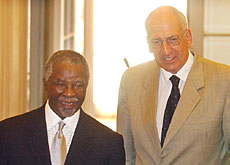Mbeki visit highlights burgeoning trade ties

The South African president, Thabo Mbeki, is paying an official visit to Switzerland aimed at cementing the good relations between the two countries.
Switzerland has become an important trade partner for South Africa, investing SFr777 million ($590 million) since 1994, but has still to shake off the controversy over apartheid-era links.
Nine Swiss companies – including the banks UBS and Credit Suisse, as well as Novartis and Nestlé – are among a group of international firms targeted by class-action lawsuits filed by victims of the former South African regime.
They are accused of propping up apartheid and discriminating against black employees.
The South African government does not support the lawsuits and the issue was not tabled for discussion at a meeting between Mbeki and Swiss cabinet members on Tuesday.
Speaking after the meeting, Mbeki said legal action was not the right way forward.
“The South African government has made its position very clear… we are against these class actions,” Mbeki told a news conference.
“We don’t believe it’s correct that matters related to the future of South Africa should be decided by United States courts.”
Mbeki’s talks with the cabinet members focused on new forms of cooperation between the two countries and recent developments in the Middle East and the Great Lakes region of Africa.
The two sides also signed a new Declaration of Intent on Joint Cooperation expected to serve as a basis for the development of new joint projects on the African continent.
Trading partners
Switzerland and South Africa enjoy good trade relations, with a trade turnover of around SFr1 billion last year.
South Africa is now Switzerland’s most important trade partner on the African continent, and many Swiss companies use the country as a base of doing business with the rest of Africa.
According to the foreign ministry, South African subsidiaries and branches of Swiss companies provide employment for around 22,000 locals.
Switzerland has supported the economic and social transition process in South Africa since 1994 with a special programme focusing on good governance, education and land reform.
It also created the Swiss-South African Cooperation Initiative, which supports projects by non-governmental organisations to improve employment opportunities for disadvantaged groups.
Apartheid legacy
Switzerland was the first country to make a financial contribution to the Reparations Fund of the Truth and Reconciliation Commission set up to heal the divisions of South Africa’s apartheid past.
The country also provided experts to help with the investigations.
Since the end of apartheid questions have been asked about the relationship between the former South African regime and Switzerland.
In April the government temporarily blocked access to its archives relating to bilateral ties with the white regime in Pretoria.
It said the decision was taken to protect the Swiss companies facing class-action suits in the United States.
Two US lawyers, Michael Hausfeld and Ed Fagan, filed the suits against 20 banks and multinationals last November.
They are seeking damages on behalf of thousands of victims of apartheid, claiming that the firms bear direct responsibility for some of the personal injury suffered.
swissinfo with agencies
South Africa is Switzerland’s most important trading partner on the African continent.
Last year trade turnover amounted to SFr1 billion ($760 million).
In 2002 Switzerland was the sixth largest direct foreign investor in South Africa.
South African subsidiaries and branches of Swiss firms employ around 22,000 people.
Nine Swiss firms are among 20 multinationals accused in class actions suits of propping up South Africa’s former apartheid regime.

In compliance with the JTI standards
More: SWI swissinfo.ch certified by the Journalism Trust Initiative













You can find an overview of ongoing debates with our journalists here . Please join us!
If you want to start a conversation about a topic raised in this article or want to report factual errors, email us at english@swissinfo.ch.